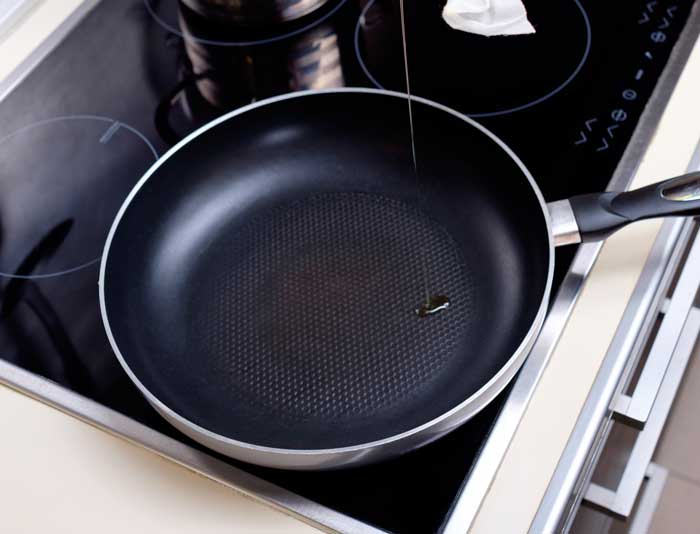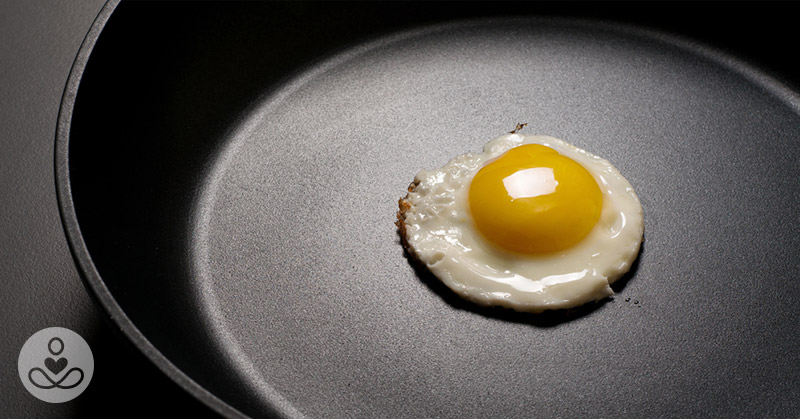Editor’s Note: A recent news report has shed more light on the issue of non-stick cookware. The Hearty Soul team thought it imperative to provide the most up to date information to our readers on the subject:
CNBC Reports: “Now two new analyses of drinking water data and the science used to analyze it make clear the Environmental Protection Agency and the Department of Defense have downplayed the public threat posed by these chemicals.
Far more people have likely been exposed to dangerous levels of them than has previously been reported because contamination from them is more widespread than has ever been officially acknowledged.
The EPA and the Department of Defense calibrated water tests to exclude some harmful levels of contamination and only register especially high concentrations of chemicals, according to the vice president of one testing company.
Several prominent scientists told ProPublica the DOD chose to use tests that would identify only a handful of chemicals rather than more advanced tests that the agencies’ own scientists had helped develop which could potentially identify the presence of hundreds of additional compounds.”
“…“Widespread contamination may be harming the health of millions or even tens of millions of Americans and the government is intentionally covering up some of the evidence,” said Erik Olson, a senior director for health, food and agriculture initiatives at the Natural Resources Defense Council, in an interview.”
Although non-stick cookware accounts for 70% of all cookware sold [1], we shouldn’t trust the toxic chemicals used in these pots and pans.
Teflon is technically the chemical polytetrafluoroethylene (PTFE), which is defined as a synthetic resin with a high melting point [2]. Teflon was accidentally invented in 1938 and trademarked in 1945. However, this substance wasn’t marketed as cookware until the 1960s [3]. It was accidentally created to be a refrigerant to replace non-toxic substances. Go figure.
It’s likely that everyone you know has these pans in their kitchen—so why are they so toxic?
Here’s Exactly Why You Need to Throw Away Your Teflon Cookware

Teflon turns toxic at high temps—in fact, at 500 degrees the fumes can kill birds and cause people to develop flu-like symptoms [4]!
PFOA is a chemical used to make Teflon and reportedly “burns off” in the process [5]. However, traces of this chemical are linked to Teflon when using the cookware. This chemical is also a probable carcinogen [6].
Recent research has found that even tiny amounts of PFOA are harmful, can pass through the placenta to children, and accumulate in the body. Even more shocking, researchers have found PFOA in public water systems in 27 states that provide drinking water to 6.5 million people [7].
In fact, DuPont, the original company that patented and used Teflon in their products (and continues to today), has been sued over their knowledge of this toxic chemical. These claims include a lawsuit from the Environmental Protection Agency (EPA), alleging that DuPont knew about the toxicity of the chemical and still let it leech into drinking water in towns neighboring the plant.
The lawsuit was settled in 2005 for $16.5 million [8]. These also include 3,500 lawsuits from the people who drank and were affected by that contaminated water [9].
Health Problems PFOA and Teflon Cause
These people in Ohio and West Virginia surrounding the DuPont plant suffered all kinds of cancers as a result of their exposure to Teflon chemicals. PFOA—which was actually original created by the company 3M and sold to DuPont—has been linked to the following problems [10]:
- Cancer
- Low birth weight
- Early puberty
- Infertility and reproductive disorders
- Autoimmune disorders
- Liver and kidney disease
- Thyroid disease
- High cholesterol
- Respiratory disease
Um… yikes?
Alternatives to Teflon
I don’t know about you, but no matter how frustrating it is getting your food stuck to the pan, I’d be way more frustrated if I had to go on chemo for a debilitating disease. (Because, yes, I’ve been there)
So let’s kick Teflon to the curb (cabinet clean out!) and stock up on some alternatives instead. Alternatives to Teflon that you can feel free to use include:
- Glass: This works great for baking, think Pyrex dishes. They’re generally not meant for stovetop use.
- Cast Iron: Works perfectly for oven or stovetop use. This is my personal favorite because it’s so versatile. Plus, you don’t have to wash it (I know, I’m lazy).
- Ceramic: Corningware is a brand of glass-ceramic baking and stovetop dishes. They work great, either way, you choose to use them. You may also choose to buy ceramic frying pans, so much safer than Teflon!
- Stainless Steel: I’m not a huge fan of stainless steel because I can’t seem to get it to stop sticking, but if you’re into it, go for it!
- Copper: Genuine copper cookware can last a very long time. Some studies show, however, that very acidic foods can cause the copper to dissolve in small amounts into your foods, and while your body does in fact need low levels of copper, too much can be dangerous, so I highly recommend doing thorough research before making this kind of purchase.
Switching to a cast iron pan, but not sure how to take care of it? Check out the video below!
But It Sticks!
People use Teflon for a reason—it doesn’t stick and minimizes the oils you have to use when cooking.
Okay, yes, I hear you people. But we need oils and fats to keep us healthy. Did you know your brain is 60% fat [11]? I have an unproven theory that cognitive decline is all about people not eating enough healthy fats. Preliminary research on this subject has yielded tentative results [12].
So with that, I say, let’s use a little more oil to keep our food from sticking. This is especially true with cast iron, which needs to be well-seasoned in order to prevent sticking food. Once you have a great cast iron, however, it’s like finding true love. It’ll work every time and never lets you down.
You can find more about the best oils to use when cooking here. My favorite is coconut oil, but you can use a range of different oils. And if you’re a butter fan, you can put a little oil in there with the butter to keep it from burning while you cook your food. A neat trick my chef in college taught me!
It’s a good idea to not heat your pan too hot initially, as this can cause burning and sticking. Cast irons retain heat really well, so once they’re heated, they typically need to be turned on low.
It might take some practice to keep your food from sticking to your new cookware, but in time, you’ll become a pro. Isn’t it worth it to avoid toxic chemicals?
Conclusion
It’s not that hard to avoid Teflon, especially when you know it’s going to cause you some health problems (and kill your parrot Peety). Seriously, ditch those pans and let’s start fresh with safe alternatives.
Happy cooking!

Sources
- https://www.motherjones.com/environment/2007/05/teflon-forever
- https://www.britannica.com/science/polytetrafluoroethylene
- https://www.chemours.com/Teflon/en_US/products/history.html
- https://www.ewg.org/news-insights/news-release/toxic-truth-about-new-generation-nonstick-and-waterproof-chemicals
- https://www.webmd.com/a-to-z-guides/features/what-is-pfoa#1
- https://www.cancer.org/cancer/cancer-causes/teflon-and-perfluorooctanoic-acid-pfoa.html
- https://www.ewg.org/research/teflon-chemical-harmful-at-smallest-doses
- https://www.nytimes.com/2016/01/10/magazine/the-lawyer-who-became-duponts-worst-nightmare.html?_r=0
- https://www.forbes.com/sites/kensilverstein/2016/07/07/dupont-may-be-forced-to-settle-chemical-lawsuits-for-hundreds-of-millions-insiders-say/
- https://www.birmingham.ac.uk/Documents/college-les/gees/conferences/nercpops/Conference2014/Diseases%20linked%20to%20PFOA%20exposure.pdf
- https://www.ncbi.nlm.nih.gov/pmc/articles/PMC3056912/
- https://www.motherjones.com/environment/2007/05/teflon-forever
- https://www.britannica.com/science/polytetrafluoroethylene
- https://www.chemours.com/Teflon/en_US/products/history.html
- https://www.ewg.org/news-insights/news-release/toxic-truth-about-new-generation-nonstick-and-waterproof-chemicals
- https://www.webmd.com/a-to-z-guides/features/what-is-pfoa#1
- https://www.cancer.org/cancer/cancer-causes/teflon-and-perfluorooctanoic-acid-pfoa.html
- https://www.ewg.org/research/teflon-chemical-harmful-at-smallest-doses
- https://www.nytimes.com/2016/01/10/magazine/the-lawyer-who-became-duponts-worst-nightmare.html?_r=0
- https://www.forbes.com/sites/kensilverstein/2016/07/07/dupont-may-be-forced-to-settle-chemical-lawsuits-for-hundreds-of-millions-insiders-say/
- https://www.birmingham.ac.uk/Documents/college-les/gees/conferences/nercpops/Conference2014/Diseases%20linked%20to%20PFOA%20exposure.pdf
- https://www.ncbi.nlm.nih.gov/pmc/articles/PMC3056912/

